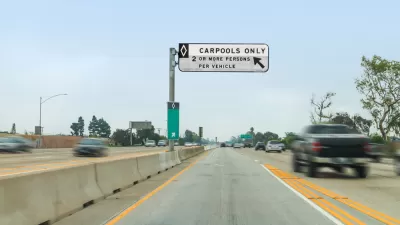You think your daily commute is bad? In one of the world's largest cities, a lack of citywide rapid transit means daily commutes of four hours for many Jakarta residents. Help is on the way, but conditions may get worse before they get better.
"Jakarta, with a metropolitan area populated by 28 million people, remains one of the world’s few major cities without a rapid-transit system, despite plans dating to the 1980s," notes Joe Cochrane. "The closest substitute, the TransJakarta Busway, carries fewer than 400,000 people a day. And a dedicated bus lane during peak hours, when the roads are clogged, does not help, as cars, motorcycles and even government, police and military vehicles illegally drive over the tiny concrete barriers that are supposed to block it off, further delaying the buses."
"But help may finally be on the way," he explains. "Jakarta, the Indonesian government and consortiums of private investors are pouring $4 billion into public transportation infrastructure projects scheduled to start between this October and 2015. They include the first stage of a subway and aboveground rail system linking south and central Jakarta; two monorail projects; an express train to the airport from central Jakarta; and an elevated train circling the outskirts of central Jakarta that would connect to existing provincial commuter rail lines west, south and east of the city."
"But with the first rapid-transit rail lines not scheduled to start operating for at least four years, and greater prosperity only adding to the numbers of cars and motorcycles on the roads, transportation experts warn that in the near term congestion is likely to worsen."
FULL STORY: Hours to Go, Just to Get to Work

Alabama: Trump Terminates Settlements for Black Communities Harmed By Raw Sewage
Trump deemed the landmark civil rights agreement “illegal DEI and environmental justice policy.”

Study: Maui’s Plan to Convert Vacation Rentals to Long-Term Housing Could Cause Nearly $1 Billion Economic Loss
The plan would reduce visitor accommodation by 25% resulting in 1,900 jobs lost.

Planetizen Federal Action Tracker
A weekly monitor of how Trump’s orders and actions are impacting planners and planning in America.

This Toronto Suburb Has More Bus Riders Than Columbus, Ohio
Brampton, Ontario used gradual improvements in service to prove that if you build it, they will ride.

Paris Bike Boom Leads to Steep Drop in Air Pollution
The French city’s air quality has improved dramatically in the past 20 years, coinciding with a growth in cycling.

Why Housing Costs More to Build in California Than in Texas
Hard costs like labor and materials combined with ‘soft’ costs such as permitting make building in the San Francisco Bay Area almost three times as costly as in Texas cities.
Urban Design for Planners 1: Software Tools
This six-course series explores essential urban design concepts using open source software and equips planners with the tools they need to participate fully in the urban design process.
Planning for Universal Design
Learn the tools for implementing Universal Design in planning regulations.
Smith Gee Studio
Alamo Area Metropolitan Planning Organization
City of Santa Clarita
Institute for Housing and Urban Development Studies (IHS)
City of Grandview
Harvard GSD Executive Education
Toledo-Lucas County Plan Commissions
Salt Lake City
NYU Wagner Graduate School of Public Service




























